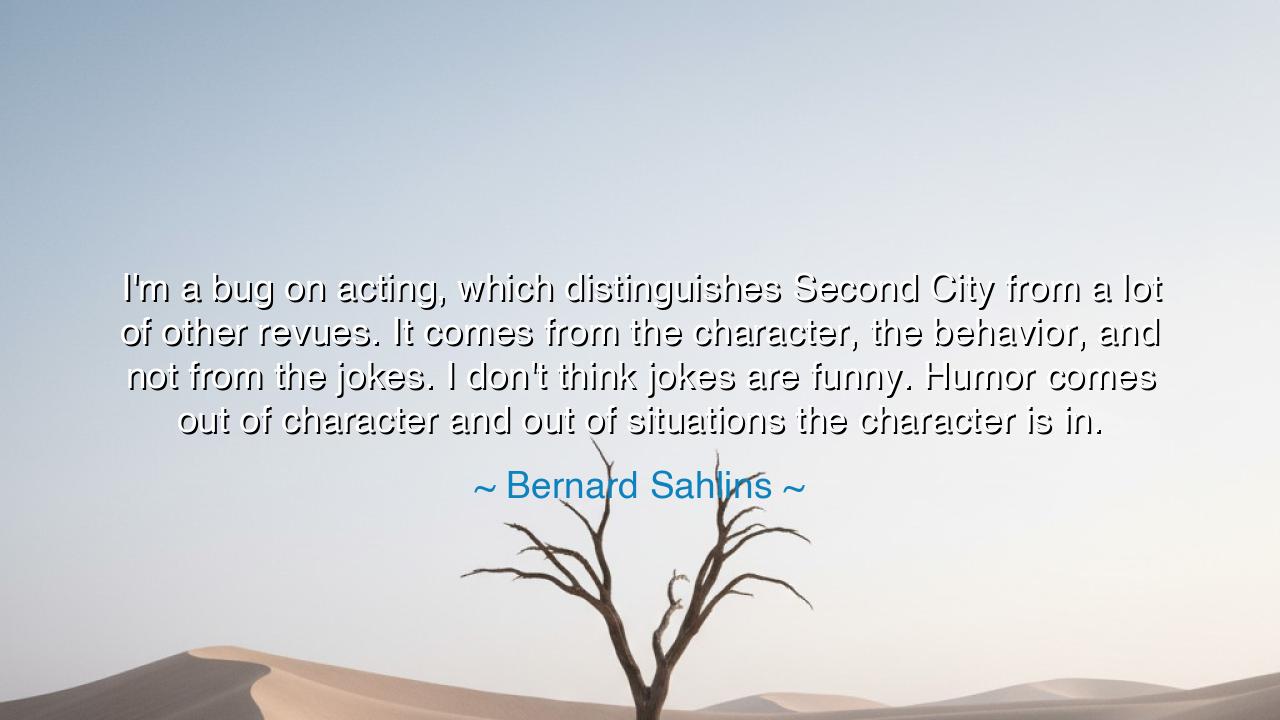
I'm a bug on acting, which distinguishes Second City from a lot
I'm a bug on acting, which distinguishes Second City from a lot of other revues. It comes from the character, the behavior, and not from the jokes. I don't think jokes are funny. Humor comes out of character and out of situations the character is in.






In the grand tradition of the ancients, where storytelling was not merely an art but the very means by which society learned about itself, the true nature of humor was often found not in the cleverness of words or the punchline, but in the character of the person speaking them and the situations in which they found themselves. Bernard Sahlins, in his reflection on the principles of Second City, imparts this wisdom when he says, "I'm a bug on acting, which distinguishes Second City from a lot of other revues. It comes from the character, the behavior, and not from the jokes. I don't think jokes are funny. Humor comes out of character and out of situations the character is in." In these words, Sahlins reveals an essential truth that humor is not just a clever turn of phrase but the embodiment of truth through character—a wisdom that has been passed down through the ages, from the playwrights of ancient Greece to the modern stage.
In the Greek tragedies and comedies, we often find that the heroes and gods are not simply figures who speak wise words or engage in elaborate schemes. They are characters whose decisions, behaviors, and actions create the drama, the conflict, and ultimately, the humor. Take, for example, the character of Odysseus, whose wit and guile were not just in his words, but in the way he navigated the challenges that life threw at him. Sophocles and Aristophanes, the great dramatists of ancient Greece, knew that comedy and tragedy were not just about telling jokes or setting up punchlines, but about revealing the very essence of humanity through characters who were deeply flawed yet remarkably relatable. In this way, humor, in the ancient sense, was always rooted in the truth of the character and the situations they faced, just as Sahlins teaches us through his observations of Second City.
The great comedians of ancient times, like Aristophanes, understood that humor is a force that emerges from the deep wells of human nature. His satirical plays were not simply about making people laugh at jokes; they were about making them reflect on the absurdities of society, of the gods, and of the human condition. The characters in his plays were often exaggerated versions of real human traits—greed, vanity, and ignorance—which made the humor not just funny, but a sharp critique of the times. Similarly, in Second City, the humor is rooted not in the jokes themselves, but in the characters' behaviors and the realness of their situations. It is the authenticity of the characters’ responses to absurd or difficult circumstances that makes the humor so powerful and relatable.
The story of Aristotle and his concept of catharsis provides a further layer of understanding here. Aristotle believed that the purpose of drama—whether tragic or comedic—was not merely to entertain, but to purge emotions and bring about a deeper understanding of human nature. In his Poetics, Aristotle wrote that a great tragedy or comedy allows the audience to experience intense emotions through the characters and situations presented, but through these experiences, they achieve emotional purification. The humor that Sahlins speaks of is, in this sense, also a catharsis—a release of tension, a way to confront the absurdities of life through the characters who act them out. It is not the cleverness of the joke that brings relief, but the truth and vulnerability of the characters that makes the humor so meaningful.
The great comedians and actors of today, such as those in Second City, carry this ancient wisdom forward. Like the playwrights of old, they understand that humor is not just about the words spoken, but about the actions and decisions of the characters they portray. Sahlins teaches us that acting, true acting, is not about delivering punchlines or mimicking behaviors—it is about living truthfully in a character’s skin and letting humanity unfold in a way that reveals the absurdity and the seriousness of life. Humor, in this sense, is not something that can be forced; it arises naturally when the characters are allowed to live authentically, without the constraint of the joke, the gag, or the punchline.
In our own lives, we must take this lesson to heart. Whether we are performers, storytellers, or simply individuals navigating the challenges of life, we must remember that humor is found not in our cleverness, but in our authenticity—in the way we live, the way we respond to the situations we find ourselves in. Just as Sahlins teaches that humor comes from character and behavior, we too must embrace our own flaws, insecurities, and imperfections, knowing that in these very moments, we are living truthfully and authentically. When we stop trying to force humor, and instead allow it to arise naturally from the situations and choices we make, we will find that laughter is often the most powerful and healing force available to us.
Thus, let us strive to live with integrity and authenticity, whether on the stage or in our daily lives. Let us embrace the humor that comes from being true to ourselves and from facing life’s absurdities with a clear mind and a light heart. For in this truth, we will find that humor is not just a tool for entertainment, but a vital force that brings us closer to wisdom, connection, and the deepest joy. Just as the ancients used humor to illuminate the human experience, so too can we, through the power of authenticity, find joy even in the most serious of situations.






AAdministratorAdministrator
Welcome, honored guests. Please leave a comment, we will respond soon